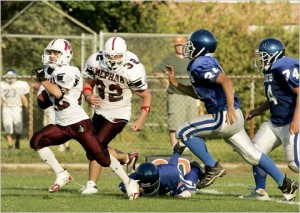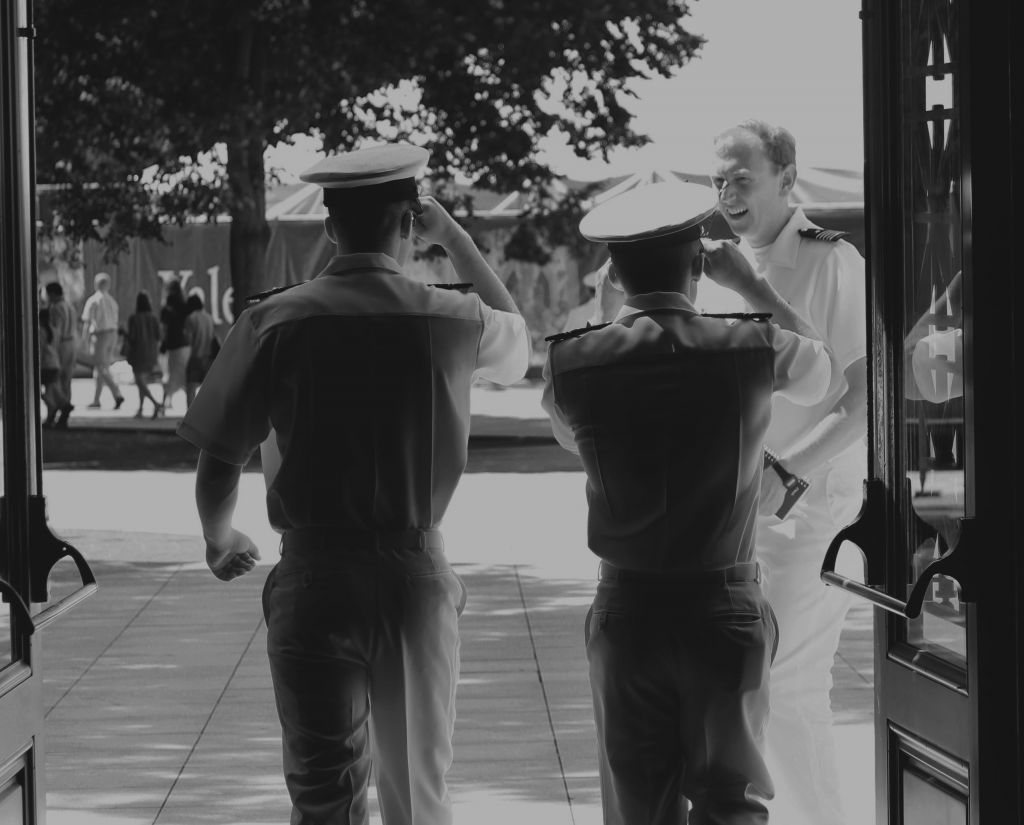
It was August and hot. The air teemed with the testosterone-fueled excitement of preseason. I had signed up for my West Hartford, Connecticut public high school’s football team with about fifty other freshmen, who, like myself, had been coaxed into helmets and pads by nostalgic fathers and then prodded into huddles by even more nostalgic coaches. I was terrified, but eager to prove myself.
Some of the other players on the team had been hiking footballs since the Pee Wees, but this was my first time on the field. I didn’t even know the positions or the rules. Though I quickly committed those to memory, it quickly became clear how little I really knew about the game when I found myself week after week on the ground, breathless and coughing up dirt.
Football, I soon learned, was about a different set of rules. It was not about knowing that a safety earned two points or that a touchback meant that the offense received the ball at the 20-yard line. Rather, it was about the preening and prancing in the locker-room, the spit-in-your-face trash-talk at the watering hole, the congratulatory-but-all-too-demeaning slaps on the ass in huddle, the misogynistic and homophobic epithet-hurling on the sidelines. It was, in short, about the codes of being a man, the semiotics of manhood. Each jaw-dropping juke, each explosive hit, each perfect spiral shapes our idealized notions about masculinity, our expectations of how—and who—a man should be.
But I didn’t have dreams of becoming a star quarterback, of leading my team to state championships, trophy on one arm, prom queen on the other. No, football was something much less romantic for me. I was gay and closeted.
So I never fully subscribed to the style and protocols of my teammates. I did not participate in the sexist banter or the posturing, I hid from the fiercest coaches, and I left immediately after practice was over to avoid the locker-room towel snapping—sweaty, dirt-caked and unshowered. I took pains to remove myself from any situation where my masculinity might be scrutinized and where my true feelings might be exposed. I spent most of my time with the team trying to forget I was there in the hope that everyone else would, too.
This is not to say that I was miserable throughout the season. I enjoyed the competition of the sport and the opportunity it provided for me to stay in shape. But when I signed up again sophomore year, I doubt it was the sprints, or the camaraderie, or our nearly undefeated season that compelled me to keep playing. More likely, it was the façade of normalcy that playing football allowed me to present. Everyday after school that I suited up in pads and ran out on the field ensured that my manliness—and, by extension, my sexuality—could not be questioned off the field. When I came out to my straight male friends from high school during my freshman year of college, one of them remarked that any speculation about my sexual orientation was quelled by my membership on the team. Football had been my closet.
Football still has, in my mind, an intoxicating allure. It has become my point of retreat, my place of solace. It’s my defense mechanism. Whenever I feel that my manliness has been called into question, whenever I hear a homophobic remark or am unfairly stereotyped, I conjure up my football days. “You think I’m weak? You think I’m a sissy? Are you calling me a faggot? Let me tell you something,” I imagine myself saying. “I played football in high school.” Every time my voice slips into affect, or I profess my love for Lady Gaga, wear deep v-neck t-shirts, or spend just a moment too long shopping for shoes, it’s okay, I remind those present, because “I played football in high school.”
I have to admit, I’m reminding myself, too. I refer to my high school football days with such frequency that it has become an inside joke among my friends. After all, I had only played for two years and never even made it to varsity. But though my friends and I kid about my frequent references to my football days, something serious underlies them: my insecurities and the societal constructs that helped produce them. My tendency—my need—to fall back on football reflects the misconception in our society that equates masculinity with heterosexuality.
I only understand my repeated allusion to my high school football days in terms of a combination of pride and self-loathing. Pride for the small rebellions I unleash against heteronormativity every time I strut into the gym with my high school football sweatshirt on, mentioning all of the squats and the deadlifts and the tackle drills and the suicides that I did; pride for the knowledge that I defy stereotypes, that I contribute a modicum of “normality” to an identity all too often deemed abnormal.
But also self-loathing. Self-loathing for defining myself in terms of an arbitrary notion of normal; for thinking about how manly I appear to others every time I walk down the street with another man’s hand in my own, or dance with a man at Toad’s, or sleep with a man; self-loathing for the knowledge that I am undeniably different no matter how hard I hit, how much I benched, how fast I ran a 40-meter split.
I’m gay whether or not I played football in high school. Nothing can change that, not even a two-year stint of heavy-hitting, or rough-and-ready cover. What really matters then is not that I played football, but that I don’t play it anymore. I left that locker-room and unsuited those pads a long time ago. And I am all the more a man for it.


